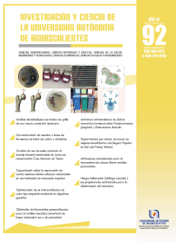Training on the separation of four valuable urban solid waste in a higher education institution
DOI:
https://doi.org/10.33064/iycuaa2024924801Keywords:
collection, management, recyclingAbstract
Inadequate solid waste management in educational centers aggravates environmental problems. Train and promote ecological awareness in the collection and classification of valuable urban solid waste within an educational community, in order to promote the reduction, reuse and recycling of waste. Training focused on reuse and recycling was developed, including the ReciclaTec campaign, promoting a conscious environmental culture among students. After the implementation of the talks, the waste generated at the institute was Polyethylene Terephthalate (PET; 201.1 kg), cardboard (55.2 kg), paper (204.2 kg) and aluminum (3.8 kg), totaling 464.3 kilograms, over a period of time of four months. Constant training and the inclusion of marked containers are essential to maintain and improve waste classification and management, promoting effective environmental education and the significant reduction of discarded waste.
Downloads
References
• Armijo-de Vega, C., Ojeda-Benítez, S., & Ramírez-Barreto, M. E. (2008). Solid waste characterization and recycling potential for a university campus. Waste management, 28, S21-S26. https://doi.org/10.1016/j.wasman.2008.03.022 DOI: https://doi.org/10.1016/j.wasman.2008.03.022
• Diario Oficial de la Federación . (20 de Octubre de 2004). NORMA Oficial Mexicana NOM-083-SEMARNAT-2003. Recuperado el 10 de enero de 2017, de https://www.gob.mx/semarnat/acciones-y-programas/clasificacion-reciclaje-y-valoracion-de-los-rsu
• García Hernández, D. N., & Uribe Gutiérrez, J. J. (2021). Apoyo a la actualización e implementación del programa interno de almacenamiento y presentación de residuos sólidos de la plaza de mercado Guarín en los subprogramas de formación y educación, separación de la fuente recolección interna de residuos y almacenamiento selectivo.
• Hindiyeh, M., Jaradat, M., Albatayneh, A., Alabdellat, B., Al-Mitwali, Y., & Hammad, B. (2022). Sustainable Green University: Waste Auditing, German Jordanian University as a Case Study. Frontiers in Built Environment, 8, 884656. https://doi.org/10.3389/fbuil.2022.884656 DOI: https://doi.org/10.3389/fbuil.2022.884656
• Marcet, X., Marcet, M., & Vergés, F. (2018). Qué es la economía circular y por qué es importante para el territorio. Asociación Pacto Industrial de la Región Metropolitana de Barcelona, (4).
• NMX-AA-015-1985 (1985); Norma Mexicana NMX-AA-015-1985, Norma Mexicana, Secretaria de Comercio y Fomento Industrial. Protección al Ambiente-Contaminación del Suelo-Residuos Sólidos Municipales-MuestreoMétodo de Cuarteo, México, 1-8.
• NMX-AA-019-1985. Protección al ambiente - contaminación del suelo - residuos sólidos municipales muestreo peso volumétrico “in situ” (1985).
• Owojori, O., Edokpayi, J. N., Mulaudzi, R., & Odiyo, J. O. (2020). Characterisation, recovery and recycling potential of solid waste in a university of a developing economy. Sustainability, 12(12), 5111. DOI: https://doi.org/10.3390/su12125111
• Quintero, C., Teutli, M., González, M., Ruiz, A., & Jiménez, G. (2003). Manejo de residuos sólidos en instituciones educativas. In Facultad de Ingeniería, Facultad de Ciencias Químicas. Benemérita Universidad Autónoma de Puebla. Recuperado de: HYPERLINK" http://www. uaemex. mx/Red_Ambientales/docs/congresos/MORELOS/Extenso/PA/EC/PAC-03. pdf.
• Rabanales-Perez, IE. (2018). Environmental education as a planning strategy for the management of urban solid waste (MSW), in a private school in the city of Chetumal, Quintana Roo.
• Ugwu, C. O., Ozoegwu, C. G., & Ozor, P. A. (2020). Solid waste quantification and characterization in university of Nigeria, Nsukka campus, and recommendations for sustainable management. Heliyon, 6(6). DOI: https://doi.org/10.1016/j.heliyon.2020.e04255
• Zapata Bravo, Á., Vieira Escobar, V., Zapata-Domínguez, Á., & Rodríguez-Ramírez, A. (2021). The Circular Economy of PET bottles in Colombia. Cuadernos de Administración (Universidad del Valle), 37(70). DOI: https://doi.org/10.25100/cdea.v37i70.10912
• Zhang, D., Hao, M., Chen, S., & Morse, S. (2020). Solid waste characterization and recycling potential for a university campus in China. Sustainability, 12(8), 3086. https://doi.org/10.3390/su12083086 DOI: https://doi.org/10.3390/su12083086
Published
How to Cite
Issue
Section
Categories
License
Copyright (c) 2024 Baltazar Sánchez-Díaz, Rudy Solís-Silvan, Azucena del Rosario Fraire-Vázquez

This work is licensed under a Creative Commons Attribution-NonCommercial-ShareAlike 4.0 International License.
Las obras publicadas en versión electrónica de la revista están bajo la licencia Creative Commons Atribución-NoComercial-CompartirIgual 4.0 Internacional (CC BY-NC-SA 4.0)









